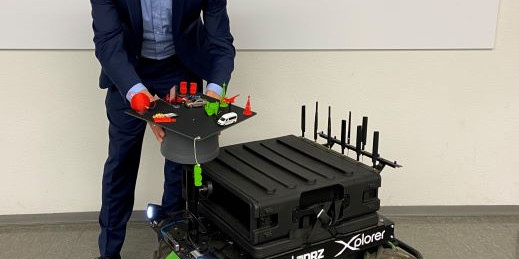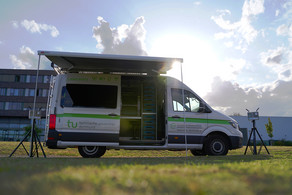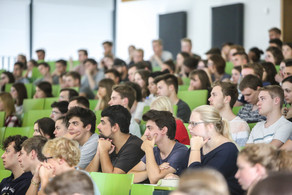Congratulations to the 3rd PhD in 2021
- News

We are happy to announce that Johannes Güldenring has successfully defended his dissertation on December 13, 2021. His thesis is titled "Multi-Connectivity Strategies for Vehicular and Robotic Communications" and proposes the multi-connectivity solution approach SKATES. Here, several Radio Access Technologies (RATs) are used in parallel in a so-called Multi-RAT approach: heterogeneous networks are combined into one robust and highly performant data link. These can be, for example, 4G, 5G, but also Wi-Fi. Multi-RAT allows the advantages of individual communication systems to be combined and is a concept leading towards future 6G networks of networks.. Intelligent scheduling is used to make a suitable network selection and switch in a targeted manner. In this way, high data rates, low latencies and real-time capability can be guaranteed. Johannes Güldenring contributed with his work to several reserach projects, for example to the EU Horizon 2020 project AUTOMAT, which has proposed a big data market place for vehicular environments.
The current evolution of partially and fully autonomous vehicles and robotic systems requires high-performance and reliable communication networks. The requirements for robotic systems are primarily real-time capability, e.g., for teleoperation of semiautonomous systems, and high data rates, e.g., for transmission of real-time video streams or vehicle sensor data. The high mobility of vehicles intensifes this requirement and leads to highly fluctuating channel characteristics. Systems can (intentionally or unintentionally) leave the range of communication networks and obstacles may block the radio signal. Especially in urban and metropolitan areas, many communication participants are competing for the available network resources. Such influences can strongly affect the performance and therefore have to be compensated.
The SKATES multi-connectivity approach has been evaluated in two realistic reference scenarios. In the first scenario, connected cars collect sensor data and contribute to a crowd-sourced Big Data marketplace. The focus lies on the simultaneous data collection of many thousands of vehicles, which have to successfully deliver data in a defined time to implement service guarantees. This thesis proposes a channel-aware Multi-RAT uploading scheme and the novel Common Vehicle Information Model (CVIM) encoding of the sensor data to optimize data uploads. In the second scenario, SKATES is implemented in unmanned aerial and ground robotic systems for exploration in post-disaster and rescue scenarios. These robotic systems are evaluated in experimental field tests during flight tests for missing person search over the Baltic Sea. Here, the challenge is real-time teleoperation in an environment with extremely poor network coverage. The results of both scenarios prove the feasibility and robustness performance of SKATES and show that both high data rates and real-time transmissions are achieved.
Further reading:
J. Güldenring, P. Gorczak, M. Patchou, C. Arendt, J. Tiemann, C. Wietfeld, "SKATES: Interoperable Multi-Connectivity Communication Module for Reliable Search and Rescue Robot Operation", In 2020 International Conference on Wireless and Mobile Computing, Networking and Communications (WiMob), Thessaloniki, Greece, October 2020.
J. Güldenring, C. Wietfeld, "Scalability Analysis of Context-Aware Multi-RAT Car-to-Cloud Communication", In 2020 IEEE 92th Vehicular Technology Conference (VTC-Fall), Victoria, B.C., Canada, October 2020. [bibtex] [pdf]
J. Güldenring, P. Gorczak, F. Eckermann, M. Patchou, J. Tiemann, F. Kurtz, C. Wietfeld, "Reliable Long-Range Multi-Link Communication for Unmanned Search and Rescue Aircraft Systems in Beyond Visual Line of Sight Operation", In Drones, MDPI, vol. 4, no. 2, May 2020.




